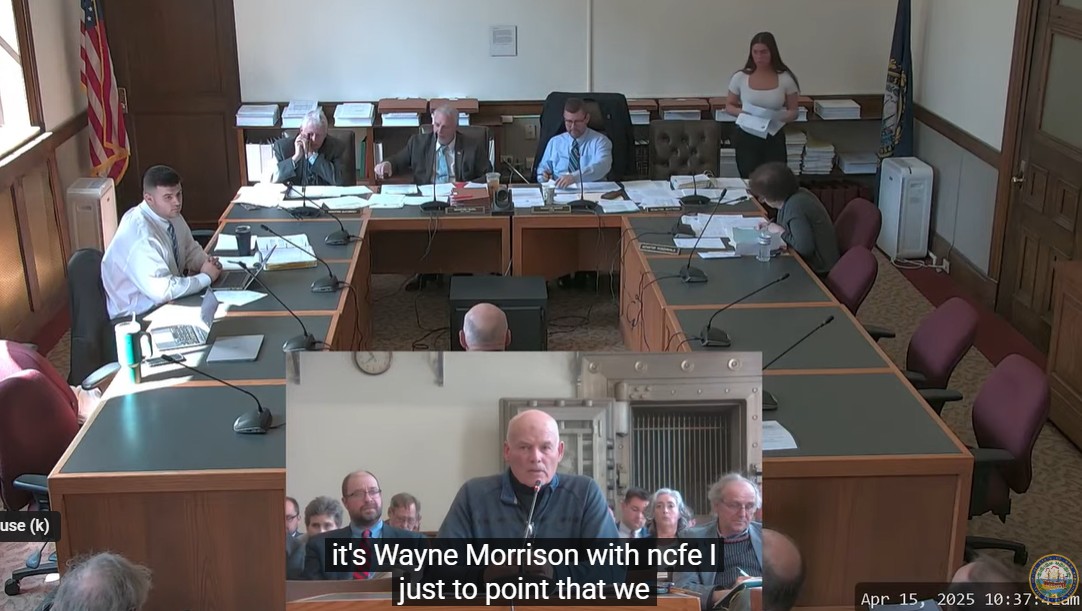By PAULA TRACY, InDepthNH.org
CONCORD – It is a perfect moment in New Hampshire for a three-year moratorium on new landfills, Senators were told during a public hearing Tuesday before the Senate Environment and Natural Resources Committee.
And they were told the current and new state environmental rules related to future landfill siting don’t go far enough related to contaminants escaping and getting into public water and tainting it with things like toxic PFAS chemicals.
The two bills were paired together and offered supporters from the North Country who have been studying this issue intently to attend and comment on both.
House Bill 171 is uncomplicated and would establish a three-year moratorium on the approval of any new construction of landfills.
House Bill 707 is complicated and would require a landfill setback of at least 1,500 feet from water and it would take contaminated fluid at least five years to get to the closest water if enacted. It would also require 24/7, 365 days a year human monitoring coverage at the landfill – though there is technology that might also work – and would not allow for other soils to be trucked in.
Gov. Kelly Ayotte has suggested a one-year moratorium on new landfills but supporters of the bill said that Ayotte has since told them she would support three years as proposed in the bill. It and the other bill sailed through the House on a voice vote.
Though the Senate Energy and Natural Resources Committee did not take a vote on the two bills, there was an indication among three of the five Senators at the end that there were language problems and concern about monitoring. Sen. Mark McConkey, D-Freedom, who by profession is in the septic business, disagreed with the aspect of the bill as it relates to imported soils and also stated he wanted it to be “clear” that this does not impact existing landfills or modifications.
Whether the bills should be in the controversial House Budget or voted on as bills separately and on to the governor’s desk was also discussed with no vote taken.
Sen. David Watters, D-Dover, said it would be “cleaner” procedurally to have HB 171 the moratorium as a bill to the governor, though he acknowledged they are both interwoven into HB 2 and “who knows what is going to happen” with that budget trailer bill.
Lebanon City Manager Shaun Mulholland said Lebanon operates a landfill and is concerned about the provisions of the bill, specifically 24/7 coverage saying it is hard to hire people and that sensors would be more appropriate.
“We’re not a billion dollar operation,” he said.
Eric Steinhauser, a licensed professional engineer for Sanborn Head and Associates that works on many landfills, said his testimony was his own and is opposed to HB 707 related to future siting.
He said it would limit where a new landfill could be sited.
A number of people from the Whitefield and Dalton area attended the public hearing on the paired bills. Some have been working for six years to oppose a proposed new landfill near Forest Lake State Park by an affiliate of Casella Waste Systems of Vermont. The DES recently denied the permit to the company, based on dormancy but it is being appealed in court.
Noting the governor’s support Nancy Morrison said the “tide is turning” on ways to deal with the state’s landfills and said she hoped the Senate could “ride that wave” as the House did in advancing provisions for new siting requirements as is outlined in House Bill 707 https://gc.nh.gov/bill_status/billinfo.aspx?id=586&inflect=2.
Rep. Nicholas Germana, D-Keene, prime sponsor of HB 171, said now is a perfect time to enact a moratorium on landfills in the state.
He said there is no need for a new landfill until the middle of the next decade.
This is if the state allows the existing landfills to build out and this bill will not impact those buildouts, it was made clear.
Henry Veilleux, who represents Waste Management’s Turnkey Landfill in Rochester, the state’s largest landfill, said if things stay the same there is capacity at Rochester until 2034 or 2035. He said in 2024, 54 percent of the waste coming into that facility was from out of state.
Rep. James Gruber, a licensed civil engineer, has worked on issues of “toxic soup” in Massachusetts and worked on a siting issue of a landfill in Vermont.
He said this is the right time for New Hampshire to take a three-year pause.
“This bill would give New Hampshire time to develop policies and tools and reduce the dumping of waste from out of state,” he said.
Click the links below to tell your lawmakers what you think of various bills.
HOUSE
House meeting schedule for April – For schedule, click day, week or month
House Sign-in Form and Online Testimony Submission
View House Online Testimony Submissions
House Remote Sign In/Submit/View Testimony Directions (PDF)
Watch House committee meetings and sessions
SENATE
Senate meeting schedule for April For schedule, click day, week or month
Senate Remote Sign In
Senate Remote Sign In Directions (PDF)
Watch Senate committee meetings and sessions





